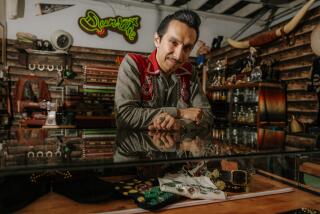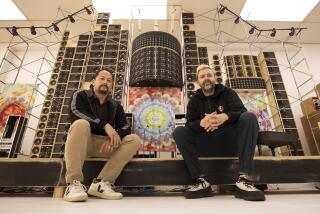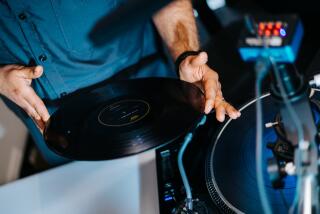Original Guitars Finds Business ‘Too Good’ : Album Jacket Gives Company Prestige Without Advertising
- Share via
During the 1960s, the Beach Boys’ and other rock music groups’ use of Fender guitars and amplifiers gave the Orange County company the kind of endorsement and credibility that advertising couldn’t buy. Fender became the equipment of choice for neighborhood bands and touring groups.
Last year, the English rock group Dire Straits again demonstrated the power of such promotion when it released “Brothers in Arms.” The album jacket features a picture of a Dobro guitar, an instrument made distinctive by the round metal sound panel under the strings.
And as U.S. sales of the album have risen past the 5 million mark and worldwide sales have soared far beyond that, the Huntington Beach-based maker of Dobro guitars has found itself awash in attention generated from the picture, which was taken against the blue Montserrat sky.
Business ‘Too Good’
Grinning broadly, Chet Lizak, chairman of the Original Musical Instrument Co., said business has been “too good”; a reference to the company’s difficulty keeping up with orders despite never having advertised.
Sales are up 20% from last year’s $350,000, which is “about what the corner gas station would do,” Lizak said. “If we’re not doing half a million (dollars) by next year and $1 million in three years, I won’t be the businessman I think I am,” he said.
Original is one of several major guitar makers in Orange County. Fender Musical Instruments is in Brea and G&L; Music Sales Inc., a company formed by Fender founder Leo Fender in 1980, is in Fullerton.
Lizak says the local instrument firms suffer from a low profile, however. “Orange County doesn’t even know we exist,” he said.
But the music world does.
In addition to Dire Strait’s Mark Knopfler, Barbara Mandrell and Willie Nelson use Original’s instruments. So do Ricky Skaggs, Uncle Josh Graves, hundreds of bluegrass bands on the county fair circuit and uncounted legions of front-porch musicians who are willing to pay for what they believe is the best sound around.
“We feel we are the Rolls-Royce of guitar makers,” said Lizak. The all-brass Dobro sells for about $700 and the Hawaiian-style guitar sells for $611, he said. Prices for 15 other models range from $400 to $1,500 and the cost can escalate to as high as $5,000 for a custom-made model with exotic inlays. In addition to its guitars, the company also makes a bass, a mandolin and a five-string banjo, all bearing the Dobro name.
Dobro guitars had their beginning in 1925 when a musician approached John Dopyera, Czech-born owner of a musical instrument repair shop in Los Angeles, and asked if Dopyera could increase the volume of his Hawaiian guitar.
Dopyera came up with a system that employed three aluminium cones, connected to the string bridge by a sound bar and amplified by a round metal plate that replaced most of the face of the guitar. Thus was born the triplate resophonic system, an innovation that continues virtually unchanged in Dobro guitars today.
In search of still more volume and a brighter sound, Dopyera and his brother Rudy then built a brass-bodied guitar, which is now the top of the Dobro line. The name that many musicians link with the finest guitar in the world was simply a combination of “Dopyera” and “brothers.”
The company--officially formed in 1928--ceased production during World War II. But the brothers began making guitars again in 1958 in El Monte, moving later to Gardena. In 1967, Rudy and Ed Dopyera formed a new corporation called Original Musical Instrument Co., moved the company to Long Beach and then relocated to Huntington Beach in 1976.
Ironically, while it is located on the West Coast, most the company’s guitars are sold in the Eastern United States, where country and bluegrass music are more popular.
Bought Company in 1985
Lizak bought the company from the Dopyera family in November, 1985, through a leveraged buyout, a process in which a company is acquired with borrowed funds and the debt typically repaid either with profits from operations or from the sale of the company’s assets.
Lizak intends to pay the debt with profits.
As the “tax man and accountant” for the Dopyera family, Lizak had been elevated to vice president and a director when he bought out Gabriela Lazar, sister of the founding brothers. Lazar, a Huntington Beach resident, is now 84 years old.
Taking the company public is under consideration, but for now, Lizak is grappling with a problem every business person dreams about--a backlog too large to handle.
John Dopyera, now 93, lives in Grants Pass, Ore., but journeyed to Huntington Beach last year to see the operation he started six decades ago. Lizak seems to visibly swell with pride recalling Dopyera’s visit and particularly the founder’s pronouncement that the company is “in good hands.”
Except for the brass-bodied model, a Dobro guitar starts life as a pile of lumber, mostly imported hardwoods: maple from Canada, Wisconsin or New England; rosewood from India; mahogany from Nicaragua and ebony from Sri Lanka. Walnut, ash and oak also are used, depending on customer specifications.
Like just about every industry from autos to zippers, guitar makers are facing fierce competition from Japan, Korea and Taiwan. So far, however, Dobro has remained relatively untouched by the Asian invasion. “The Japanese have attempted a resophonic but never made anything worth a hoot,” said Don Young, who oversees Original Musical’s dozen production workers. “They just don’t have the sound or the quality.”
Musical Pilgrimage
To Dobro guitar players from around the world, a visit to the Huntington Beach factory apparently is something of a musical pilgrimage. And so frequent are the visitors that Lizak said he is considering a museum at the plant, tracing the company’s heritage.
Visitors see a guitar made by hand, the way Dopyera did it nearly 60 years ago and the way Lizak and Young intend to keep on doing it.
“You can keep good control on quality (by hand-building) and tailor a guitar to fit a person’s needs,” said Young.
Making a guitar the “old-fashioned way” means the company has to depend on sending some work to outside craftsmen “who take their sweet time,” said Lizak. About 200 guitars, five-string banjos and basses are crafted monthly at the plant and shipped around the world.
About 2% of the instruments are custom-made, such at the one made for Barbara Mandrell, which had “Happy Birthday Barbara, from Mom and Dad” etched on the back.
From a cluttered and unpretentious office off the shop floor, Lizak and his wife Betty actually run an expanded mom-and-pop company. “Mom” Lizak is the president and chief of paperwork.
And at 67, Lizak apparently is having the best time of his career. “In the back of my mind, while in (high school) woodshop class, I said, ‘Someday I’m going to have a nice woodshop.’ ” Lizak now has a 10,000-square-foot woodshop and dismisses suggestions that he operate at a slower pace.
“Retirement to me is doing what you like to do when you like to do it,” he said. And the smell of wood and glue, the hum of the machinery and the scattered paperwork seem to be keeping Lizak--and a new generation of guitar players--quite happy.
More to Read
Inside the business of entertainment
The Wide Shot brings you news, analysis and insights on everything from streaming wars to production — and what it all means for the future.
You may occasionally receive promotional content from the Los Angeles Times.










